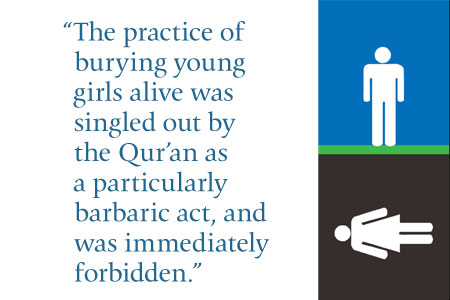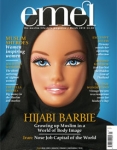
Beware a New Jahiliyyah
Issue 66 March 2010
Has much changed since the pre-Islamic era of Jahiliyyah in the Arabian Peninsula?
As a child being taught about the history of Arabia before the advent of Islam, one of the most enduring images burnt into my imagination is that of young girls being buried alive by their fathers. The historical era of pre-Islamic Arabia, commonly referred to as the Jahiliyyah – the period of ignorance – is described as one where women were treated brutally, the property of their men-folk. When a man died, his wives would be inherited by his sons. Women clearly could not own property, and had no say in who they married.
Prophet Muhammad’s message of social equality was radical about women’s status: they were considered equal. They were human beings with human rights. They could own property, choose their own spouses and had the right of self-determination. The horrible practice of burying young girls alive was even singled out by the Qur’an as a particularly barbaric act, which was immediately forbidden.
But what if I was to tell you that this is happening today?
In February of this year in Turkey, a sixteen year old girl was buried alive by her family. Police found a two metre hole that had been dug underneath a chicken pen in the family home. Inside it, they found the body of the girl, in a sitting position with her hands tied. Media reports said the father had told relatives he was unhappy that his daughter had male friends. A post-mortem examination revealed large amounts of soil in her lungs and stomach, indicating that she had been alive and conscious while being buried.
It is a gruesome tale - horribly reminiscent of girls being buried during the period of pre-Islamic Arabia - which has me feeling sick each time I think about the helpless young woman as the earth was piled upon her.
The connection between this case and that of female infanticide during the period of Jahhiliyyah is particularly graphic, but many women are murdered in similarly motivated ‘honour killings’ all over the world.
Some Muslim women today are in positions of near-slavery which echo that same period. A Saudi tribal court ruled that a woman’s marriage could forcibly be broken up against her will but in line with her family’s wishes. In India, a Muslim woman raped by her father-in-law was forcibly divorced from her husband because the judge ruled that even though it was she who was the victim, the rape had nullified her marriage. In Afghanistan, women are bought and sold in public markets. It is hard not to come to the conclusion that these are cases of women being treated as property, with no self determination, no marital rights and being killed or kept alive at the whim of men. It is hard not to come to the conclusion that this is reminiscent of the time of Jahiliyyah.
The word Jahiliyyah has a powerful impact on the Muslim psyche, and so I use the word with careful consideration. It is not an easy choice to do so, but I feel that the time has come that the only way to wake up the Muslim world to the enormity of the suffering and horror that some Muslim women are facing is to use terminology from within the Muslim tradition that conveys the magnitude of that suffering: Jahiliyyah.
To those who wish to use these incidences and this article to continue to heap their bigoted attacks on Islam, I would suggest that they first look closer to home, that those who live in glass houses should not throw stones. Tragically, women are treated badly across all societies, irrespective of culture and religion. For example, in the UK alone, two women a week are killed in domestic violence cases. One in four women will suffer domestic violence during their lifetimes and a similar number will be the victims of rape or attempted rape. The horrific acts women are subjected to are perpetrated by sick and warped individuals who are operating outside the bounds of morality and religion. None of these actions are because of religion – they are all in spite of it.
This article is aimed at the Muslim world: it is time for a wake-up call, and one way to do this is to evoke the imagery most familiar to Muslims. It is time for the violence against women to stop.
Shelina Zahra Janmohamed is the author of Love in a Headscarf, and blogs at spirit21.co.uk
Bookmark this |
|
Add to DIGG |
|
Add to del.icio.us |
|
Stumble this |
|
Share on Facebook |
|
Share this |
|
Send to a Friend |
|
Link to this |
|
Printer Friendly |
|
Print in plain text |
|


Comments
0 Comments